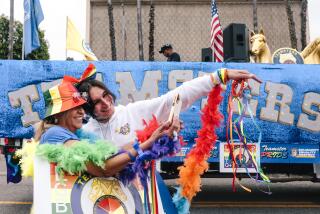U.S. Is Willing to Pay Teamster Overseer Costs
- Share via
NEW YORK —
The Justice Department offered Friday to create a $100,000 operating fund to help finance the work of three court-appointed officials who are supervising the affairs of the giant Teamsters Union.
The offer was made by Randy M. Mastro, an assistant U.S. attorney, at a court hearing called to air charges that the union is refusing to pay legitimate fees and expenses of the court officials, despite its pledge to do so under terms of a court agreement.
James T. Grady, general counsel of the Teamsters, said that the union is objecting to the “unreasonable and exorbitant” costs of the court appointees. He also complained that they claim more authority than they actually have.
Mastro told U.S. District Judge David N. Edelstein that the $100,000 fund would solve the “practical problems” of the union monitors, who told the hearing that they are having difficulty hiring staff and renting office space because of the Teamsters’ objections.
As agreements are reached on fees, payments made by the Teamsters would serve to replenish the fund, Mastro said.
Edelstein, who took no action on Mastro’s offer, could order the Teamsters to pay the bills submitted to date. But he stopped short of doing so, saying that he wants all parties to try to reach a settlement.
If a voluntary agreement fails, Edelstein said that he might issue an order.
The appointment of the three-member oversight board was agreed to by the union to settle a civil racketeering suit in which the government accused the Teamsters of being dominated by organized crime. The union also agreed at the time to pay all costs of the overseers.
Frederick B. Lacey, an attorney and former federal judge in New Jersey who was named chairman of the panel by Edelstein, accused the Teamsters of bad faith. He told Edelstein that in recent weeks “I have encountered nothing but opposition and intransigence” and that union officials even had attacked him personally in their monthly publication, the International Teamster.
“They are arguing about picayunish receipts (of the overseers) while they deal with millions of dollars in regular union expenditures every day,” Lacey declared.
Edelstein, for his part, said that he wondered how much the court hearing was costing the 1.6-million-member union, which was represented by a large New York law firm. The judge complained that the law firm filed a “burdensome” affidavit for him to read less than 24 hours before the hearing.
“You know something about the fees your firm is charging for this, don’t you?” he asked one attorney. “You don’t have to answer that.”
Grady, claiming that some overseers are exceeding their authority, said that Michael H. Holland, the court-appointed election officer, is beginning his work far too early in preparation for nationwide Teamster elections in 1991.
But Holland said that he must begin the process soon because delegates to the Teamster convention, which will select a new president, will be chosen in 1990 by hundreds of Teamster local unions across the country.
More to Read
Go beyond the scoreboard
Get the latest on L.A.'s teams in the daily Sports Report newsletter.
You may occasionally receive promotional content from the Los Angeles Times.










